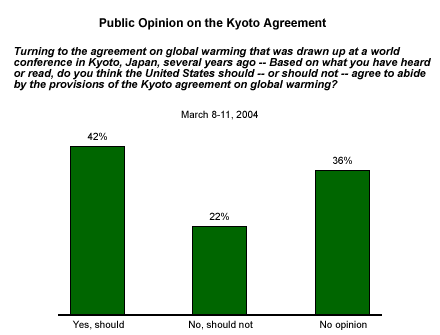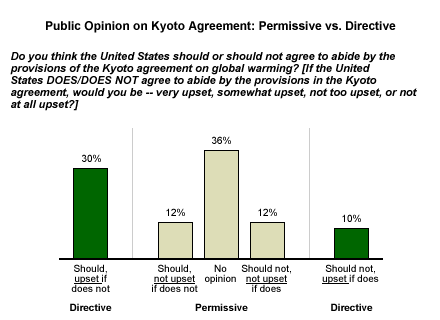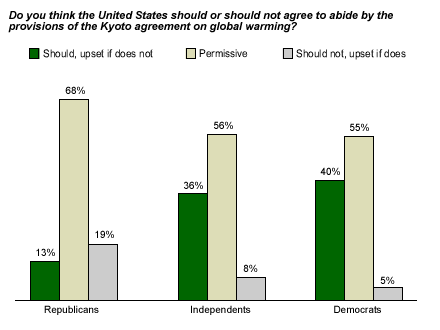"These 10 days could change the history of humankind, " then-Japanese Foreign Minister Keizo Obuchi said as he addressed the U.N. Framework Convention on Climate Change in Kyoto in December 1997. In those 10 days, the convention's delegates, who came from more than 150 nations, composed a treaty that required all countries to reduce the emissions of greenhouse gases. The Bush administration backed away from the resulting Kyoto Protocol in 2001 and has thus far declined to reconsider it.
Gallup's recent Environment poll* indicates that few Americans have a strong view as to whether the United States should abide by the provisions of the Kyoto agreement. The poll, conducted March 8-11, shows that 42% of Americans say the country should abide by the agreement, while 22% disagree. An unusually large number of respondents, 36%, volunteered that they are unsure.

Many of the people who express a view about the Kyoto agreement do not feel strongly about it. Respondents who said that the United States should abide by the agreement were asked how upset they would be if the United States did not take that action. Similarly, respondents who said the United States should not abide by the treaty were asked how upset they would be if the country did abide by the agreement's provisions.
The results show that 30% of all Americans want their country to abide by the Kyoto agreement, and would be "very" or "somewhat" upset if the United States refused. On the other end of the spectrum, just 10% of all Americans do not want the United States to participate in the agreement, and would be upset if it did.

People who say they would be upset (either very or somewhat) can be classified as having a "directive" opinion -- they want their opinions to prevail. People who express an opinion but would not be upset if the opposite condition prevailed can be classified as having a "permissive" opinion -- they essentially "permit" the country's leaders to do whatever the leaders deem best. People who have no opinion can also be assumed to have a permissive opinion, because they provide no direction to leaders one way or the other.
By this definition, 60% of Americans have a "permissive" opinion on the Kyoto agreement. Though people who express an opinion are more likely to favor, rather than oppose, U.S. participation in the Kyoto agreement, the issue is unlikely to be a major factor in public policy because such a large majority is willing to defer judgment.
An examination of "permissive" versus "directive" opinion by party affiliation shows that even among Democrats, who feel strongest about environmental issues, a clear majority has a permissive rather than a directive opinion.

Forty percent of Democrats say that the United States should abide by the Kyoto agreement and that they would be upset if the United States refuses. Just 5% take the opposite point of view (that the United States should not abide by the Kyoto agreement) and would be upset if that view did not prevail. But 55% of Democrats express a permissive opinion -- they would not be upset by whatever action the government takes, or they take no stand on the issue at all. Similarly, 56% of independents and 68% of Republicans express permissive opinions.
These results suggest that the Bush administration has a great deal of latitude in this matter. As with many other public policy issues, most Americans are willing to follow their leaders wherever they want to go.
*Results are based on telephone interviews with 1,005 national adults, aged 18 and older, conducted March 8-11, 2004. For results based on the total sample of national adults, one can say with 95% confidence that the margin of sampling error is ±3 percentage points.
In addition to sampling error, question wording and practical difficulties in conducting surveys can introduce error or bias into the findings of public opinion polls.
